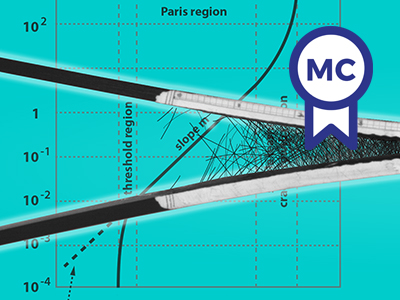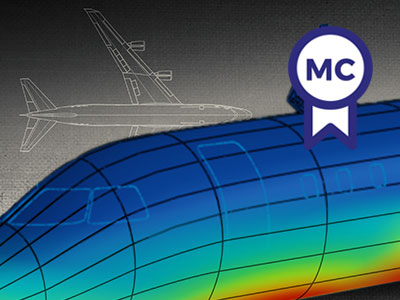Overview
Theoretical understanding of linear Finite Element Modeling (FEM) and its application to practical engineering problems.
This course delivers the skillset in linear or structural modeling that is required to solve structural problems from which you can develop finite element (FE) models for practical applications. It also teaches how results can be correctly interpreted. The course introduces you to the theory behind FE software and offers you practical experience in using FE software. The course uses a commercially available FE package (access provided for the duration of the course ) in a series of weekly practical sessions where models are constructed for sample problems and results are verified against simplified analytical models or open literature.
The majority of professionals in many branches of mechanical engineering will benefit from adding finite element method (FEM) to their skills array. The ability to develop modeling skills, based on a solid theoretical foundation, under supervision in a non-critical environment will allow you to acquire new skills and techniques in a logical and progressive manner.
The main topics of this course:
- finite element method
- linear static analysis
- finite element type formulation
- finite element model setup using commercial software
- plane stress/strain
In this course you will gain:
- Strong theoretical understanding of FEM
- Application of FEM to practical engineering problems
- Efficient modeling techniques
- Understanding the importance of verification and validation
Practicals and assignments are done using Abaqus (for which you will obtain a student license for the duration of the course). Note that TU Delft can offer you only a student license of Abaqus, which is sufficient to complete the course. (More information about the software in the "Details" tab.)
After finishing this course, or if you have sufficient experience with stress/structural analysis, you may choose to take the second course Non-linear Modeling.
Earn a Microcredential with this course
A Microcredential is an additional quality certification for small educational units. It shows what knowledge, competence and experience the participant has gained upon successful completion of the course. A Microcredential is awarded in the form of a digital badge which can be shared and is instantly verifiable.
This certification is awarded to participants who enroll and complete the course starting on September 4, 2023 or later.
More information
Details
Computational methods in structural analysis are of prime importance in industry as tools to assess the efficiency and performance of structures in the field of aerospace, mechanical, civil and biomedical engineering. A combination of theoretical and practical knowledge in finite element (FE) analysis are valuable skills needed to address such problems in industry. To efficiently model a real life engineering problem using finite element analysis and predict its future behavior, an engineer must possess a strong theoretical understanding of the finite element method (FEM) along with an understanding of the importance of verification and validation of such computational models.
Course Syllabus
Each week consists of 1 lecture and 1 practical. Only week 1 consists of 2 lectures to provide a solid foundation in FEM before switching to using commercial software.
Week 1: Information about the course; An introduction to the finite element method; Finite element formulation using the bar element with the direct stiffness approach.
Lecture 2: Stiffness matrix formulation by inspection; Minimum total potential energy approach applied to the finite element formulation; Weighted residual approach and its use to formulate a finite element equilibrium equation; Shape functions; connectivity matrix.
Week 2: Truss element in a 2D plane; Transformations between co-ordinate systems; discretisation.
Practical: A first view of the software you chose to use; The example dealt with in the classroom lectures of week 1 is worked out in the software for verification; A peek into the input files; Extra: a look at scripting.
Week 3: Euler-Bernoulli Beam Theory; Pure beam bending element formulation; Frame element formulation; Modified transformation matrix.
Practical: number of elements; Different types of elements; what is a good mesh?
Week 4: Higher order approximation functions; Lagrange polynomials; Natural Coordinate systems; Isoparametric element definition.
Practical: Post-processing results and errors; Convergence studies and errors; An example problem with convergence check.
Week 5: 2D triangular elements under in-plane loads and bending loads; Basic theory behind plate bending; Shape functions, stiffness matrix, transformation matrix and force vector of membrane elements; Polynomial function for the plate bending element.
Practical: Boundary conditions, load types and other constraints; Work together on special symmetry conditions; Model size reduction.
Week 6: 2D rectangular elements under in-plane loads; Shape functions in standard and natural co-ordinates; Stiffness matrix formulation of isoparamteric elements; Key features of quadrilateral elements; Extra: gauss quadrature (video).
Practical: Recap on material properties and definition; Offsets in shells and beams; Plane-stress and plane strain conditions; Example problems with both cases.
Week 7: lecture time kept open for discussion and remaining questions
Practical: Matching and non-matching meshes in multi-part models; How to overcome non-matching meshes; Applying special constraints and methods to do so; An exercise using multiple parts in one model.
Assignments
Multiple assignments are provided, both theoretical and practical.
Assessment
Homework submissions throughout the course, which will require theoretical understanding, practical use of commercial software and programming own pieces of FE code.
Software license
Practicals and assignments are done using Abaqus (for which you will obtain a student license for the duration of the course).
Can I use a different software?
Linear Modeling course focuses primarily on the theory behind FEM and the essential steps that need to be taken. Many students who have entered the industry reported that they had no difficulty applying the theory they learned to different software. They found the course valuable because it teaches them to develop a critical eye, and the workflow is similar across various software. While we cannot provide a license or support for a different software, you are still free to use a software of your choice. All programs should generally operate in a similar way, and the theory explained in this course is consistent across all software, so the course will still be beneficial regardless of the program you choose to use. Please be aware that if a different software is used, it will be the student's responsibility to find the correct implementation of the problem. Unfortunately, we won't be able to provide support in this situation.
Qualifications
Certification
If you successfully complete your online course you will be awarded with a TU Delft certificate and a Microcredential (a digital badge which can be shared and is instantly verifiable).
This certificate will state that you were registered as a non-degree-seeking student at TU Delft and successfully completed the course. The certificate will also indicate the number of ECTS credits this course is equal to (3 ECTS) when this course is taken as part of a degree program at the university.
This course is a MSc course in the Faculty of Aerospace Engineering. If you decide that you would like to apply to the full Master's program in Aerospace Engineering, you will need to go through the admission process as a regular MSc student. If you are admitted, you can then request an exemption for this course that you completed as a non-degree-seeking student. The Board of Examiners will evaluate your request and will decide whether or not you are exempted.
Chartered Engineering Competences
All our online courses and programs have been matched to the competences determined by KIVI’s Competence Structure, a common frame of reference for everyone, across all disciplines, levels and roles.
These competences apply to this course:
- A1: Extend your theoretical knowledge of new and advancing technologies.
Admission
Below, you can find the expected prior knowledge required to participate in this course. Please note that these are provided as indications only. TU Delft will not request proof of this prior knowledge through copies of degrees or diplomas. However, it is your responsibility to ensure that you possess the necessary knowledge, acquired through prior education or relevant work experience.
- A relevant BEng or BSc degree in a subject closely related to the content of the course or specialized program in question, such as aerospace engineering, aeronautical engineering, mechanical engineering, civil engineering or (applied) physics.
- The learning objectives of the following TU Delft courses:
- Level of English equivalent to one of the following certificates:
- TOEFL score 90+ (this is an internet-based test)
- IELTS (academic version) overall Band score of at least 6.5
- University of Cambridge: "Certificate of Proficiency in English" or "Certificate in Advanced English"
Admission process
In order to complete your admission process you will be asked to upload a valid copy of your passport or ID card.
Contact
If you have any questions about this course or the TU Delft online learning environment, please visit our Help & Support page.


